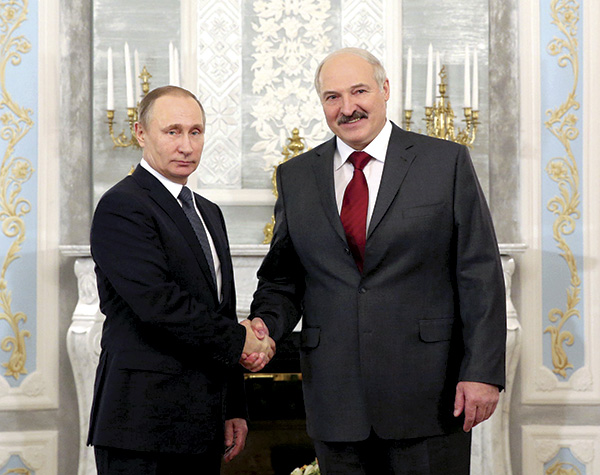For the first time since December 2010, Minsk has hosted a session of the Belarus-Russia Union State Supreme State Council. As a rule, the agenda of such events tackles budget fulfilment from the previous year and approves the major financial document for the new period. Foreign policy is also agreed.

Photo: BelTA
Priority tasks for the Union State development were previously adopted for 2014-2017. The issues submitted to the heads of state have been thoroughly elaborated during the preparation for the session at both expert and top levels. The recent meeting between the presidents of Belarus and Russia, in Sochi, deal with this. However, external events play their part and Mr. Lukashenko has been obliged to be frank: integration is being tested against a background of global economic instability. Vladimir Putin agreed that this is a serious risk factor. Prices are falling, and mutual trade turnover is shrinking, which makes it appear that integration processes are losing momentum.
The President of Belarus noted that misbalances in international relations and lack of co-ordination in economic policy affect trade. He asserted that the focus centres around ‘the removal of barriers and the provision of an efficient single market for goods, services and capital, as well as mutual support’. Mr. Lukashenko has proposed that all venues and formats of Union State development and co-operation be employed, with efficiency as the watchword. He underlined, “I think you’ll agree that, as part of integration, created by us with you, conditions exist to work consistently and in a coherent manner. As they say, with the precision of a clock mechanism.”
Mr. Putin noted that the development of industrial co-operation, primarily high technologies, is a key factor in the economic growth of the Union State. According to the Russian President, we must expand production of science-intensive goods and replace the manufacture of foreign components, especially in those branches directly influencing security. Capacity exists to do so, with Russian-Belarusian co-operation in power engineering being of strategic character. The construction of the Belarusian nuclear power plant is in full swing. “Undoubtedly, this is a flagship project,” said the Russian President, adding that $10bln of Russian investment has been dedicated to the project.
The Russian President believes that inter-regional collaboration has the potential to promote economic ties and has praised Mr. Lukashenko’s efforts at co-operation. He confirmed his plans to take part in the 3rd Forum of Regions of Belarus and Russia, due to be held in Minsk in June.
Since the Union State was launched, trade-economic, sci-tech, educational and cultural ties have been strengthened, with legislation drawn up to cover all areas of collaboration. Mr. Putin thanked Mr. Lukashenko for his actions as a political figure acting in the best interests of the Union State, alongside the first President of Russia, Boris Yeltsin. Mr. Putin underlined that Russia intends to continue mutually beneficial integration, under equal terms, with Belarus, via the Union State mechanism.
The Belarus-Russia Union is large in scale and reaches beyond the economic context. Moreover, Mr. Putin sees the Union State as the basis for multi-format inter-state structures within the post-Soviet space: the Customs Union, the Single Economic Space and, finally, the Eurasian Economic Union.
The Russian President thanked his Belarusian colleague for having been part of these processes since the beginning and noted that the ‘dvoika’ project continues to have relevance. Mr. Lukashenko focused on constructive dialogue in politics, economics, security, social and cultural areas as evidence of achievement of common goals.
The session resulted in adoption of decisions across all spheres and it was agreed that crisis phenomena will be mostly efficiently overcome by uniting efforts: strengthening co-operative ties, agreeing a single industrial policy and putting aside barriers to a single market.
The approval of the common budget also testifies to the fact that Minsk and Moscow view the Union State as vital; 6bln Russian Roubles are to be spent on financing around 40 joint programmes.
Top priority tasks of Union State development in the mid-term have been clearly outlined, with our countries pursuing foreign policy in an agreed manner.
Of course, the Supreme State Council couldn’t overlook security issues, including the application of joint forces.
The Minsk session of the Union State Supreme State Council was rather businesslike and dynamic, showing that no barriers truly exist between Minsk and Moscow, as our presidents have underlined many times. There is no need to question the need for Belarusian-Russian integration. It has been declared clearly and unanimously that this vector should be actively and purposefully pursued. Moreover, it will play the role of a pilot project for further transfer of experience, for wider integration projects within the post-Soviet space.
The spirit and tone of the session itself can be described as quietly prudent, although our heads of state noted the risks brought about by external conditions. These do affect bilateral interaction, primarily, in the economic sphere, but our presidents understand problems objectively and have a clear vision of how to proceed, without haste or panic. On the contrary, we see sensible consideration and understanding of how best to overcome difficulties.
Our Moscow colleague-journalists note that almost half of the Russian Government arrived in Minsk, filling the Palace of Independence’s largest hall. A range of meetings and negotiations took place at ministerial and inter-departmental levels, showing our political will and the desire to reap tangible fruits.
By Vasily Kharitonov











